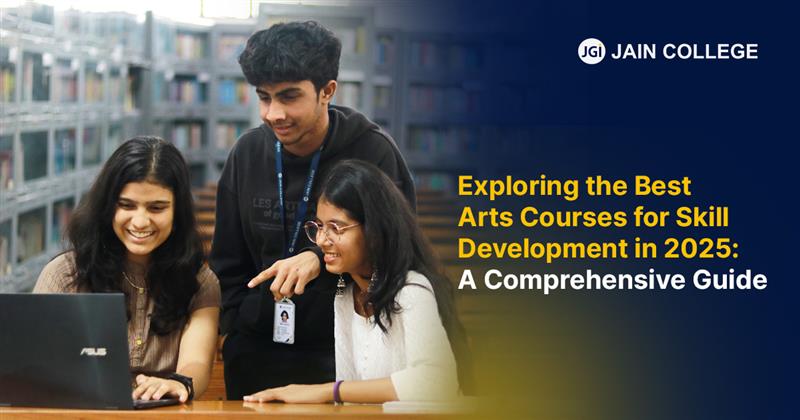
As the creative industries continue to evolve rapidly, arts education in 2025 is placing a greater emphasis on skills that combine technical expertise with artistic creativity. Whether you’re a budding artist, storyteller, or game designer, arts courses today cater to the demands of a highly digital, globally interconnected world. These programmes not only refine traditional arts skills but also embrace cutting-edge technologies and interdisciplinary learning. This guide will help you explore the trending arts courses for skill development in 2025, offering insights into key areas like digital storytelling, game design, and more.
In 2025, arts education is no longer solely about traditional techniques like painting or sculpture. It has expanded to include fields such as digital art, virtual reality, game design, and creative entrepreneurship. The goal now is to equip students with industry-ready skills that are applicable in today’s ever-changing creative landscape. This transition reflects the growing demand for versatile professionals who can bridge the gap between artistry and technical innovation.
The shift towards skill-based learning has led to the introduction of programmes that integrate technology, creativity, and management. These courses cater to various fields, offering real-world applications and professional development opportunities.
Below are some of the most sought-after arts courses in 2025. These programmes are specifically designed to develop practical skills, foster creativity, and prepare students for careers in industries such as entertainment, design, education, and management.
Digital storytelling remains one of the most powerful tools for communication and creativity in today’s world. As technology advances, storytelling no longer relies solely on written text; it now incorporates video, animation, interactive media, and social media campaigns. This course focuses on crafting compelling narratives for various digital platforms, from social media to online video channels.
Game design is one of the fastest-growing sectors in the creative industries. This course covers the entire game development process, from prototyping to conceptual design and virtual environment creation. It merges technical knowledge with artistic creativity, allowing graduates to build immersive gaming experiences that engage players in new ways.
Art therapy is gaining traction as a way to use creative practices to promote mental health and personal development. This unique course combines techniques from art and therapy to help individuals overcome emotional challenges through creative expression, making it particularly relevant for those pursuing careers in mental health and therapeutic professions.
This course delves into modern art practices, focusing on their cultural and societal impact. Students explore contemporary art forms, such as installations, performance art, and digital media, while developing a critical understanding of how art reflects and influences global social movements.
This course is designed for educators who want to incorporate art into their teaching methods. It explores how to use art to engage students creatively, build critical thinking skills, and enhance learning through hands-on experiences. By incorporating inquiry-based learning methods, students develop innovative ways to use art as a pedagogical tool.
The arts and heritage sector is expanding as cultural organisations demand more leaders with both creative expertise and business acumen. This course focuses on arts management, including skills in branding, cultural policy, sustainability, and audience engagement. It prepares students for roles such as gallery curators, museum directors, and cultural project managers.
In addition to the key courses mentioned above, the field of arts education in 2025 is marked by several emerging trends that emphasise innovation and the integration of modern technologies.
As technology continues to transform the creative industries, arts courses are incorporating tools such as VR platforms, AI-assisted design software, and 3D printing. These technologies not only enhance the creative process but also provide students with the skills to adapt to future industry developments.
Environmental sustainability is becoming a key focus within the arts. Many courses now include modules on sustainable art practices, which teach students how to create art using eco-friendly materials, promote sustainability through their work, and understand the environmental impact of their creative processes.
With the rise of globalism, many arts programmes now integrate a deeper understanding of cultural diversity. Courses include international art history, global contemporary art movements, and collaborative projects that allow students to engage with artists and institutions worldwide.
As the art market grows, the demand for creative entrepreneurs has never been higher. Many new arts courses blend creativity with business education, focusing on topics like branding, digital marketing for creatives, and managing creative projects. This gives students the skills to not only create art but also turn it into a profitable business.
As we move into 2025, the landscape of arts education is shifting toward more skill-oriented, interdisciplinary learning experiences. Whether you’re interested in digital storytelling, game design, or arts management, these trending courses offer opportunities to hone valuable skills that are in high demand across various creative industries. Stay ahead of the curve by exploring innovative programmes that not only foster creativity but also prepare you for successful careers in today’s dynamic world.
Frequently Asked Questions (FAQs)Courses like Game Design: Merging Art with Technology, Digital Storytelling, and Arts Management are among the most popular, given their focus on skill development and real-world applications.
Yes, many institutions offer online versions of these courses, providing flexible schedules for students around the world.
Game Design: Merging Art with Technology is perfect for students who want to combine technical skills with artistic creativity.
Absolutely! Many arts courses offer introductory modules to accommodate learners at all levels, from beginners to advanced students.

JAIN PU College, a part of the renowned JGI Group, is committed to empowering students with quality education.
Beyond academics, the college ensures its online content reflects the same standard of excellence. Every blog and article is meticulously vetted and proofread by subject matter experts to ensure accuracy, relevance, and clarity. From insightful educational topics to engaging discussions, JAIN PU College's content is crafted to inform, inspire, and add value to its readers, reflecting the institution's commitment to intellectual growth and innovation.
View all Blogs